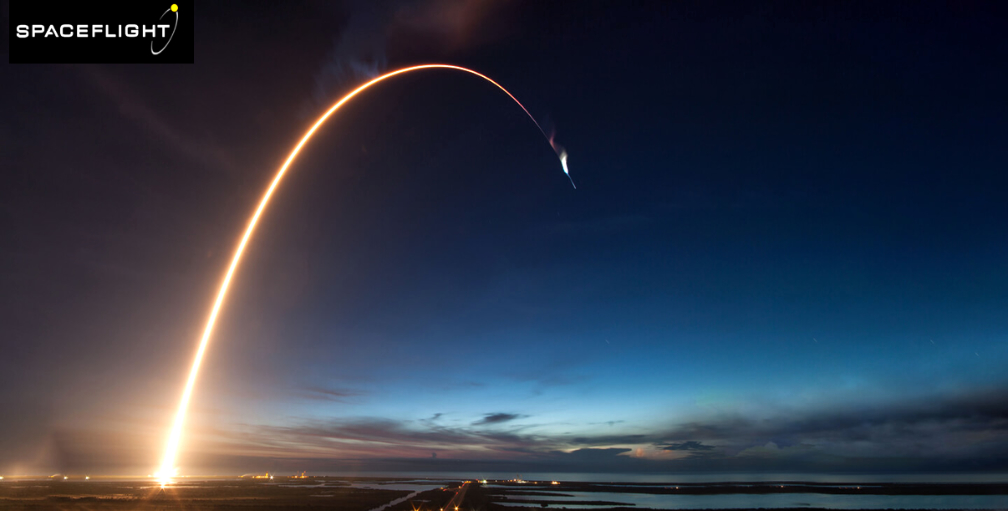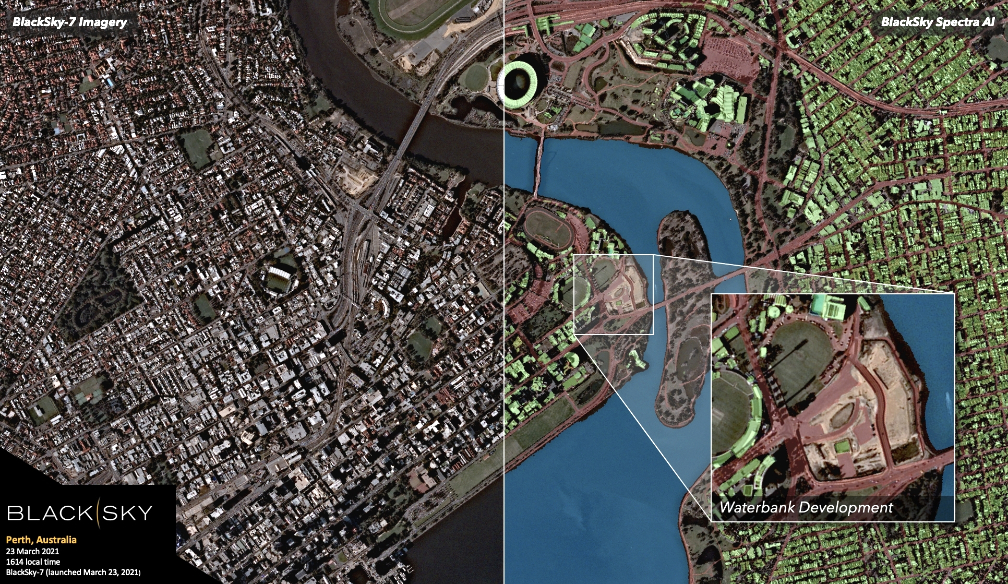BlackSky, who recently announced a planned business combination with Osprey Technology Acquisition Corp. (NYSE: SFTW), has secured five Rocket Lab missions to deploy nine satellites between March and the end of 2021.

The first of these launches occurred on March 22, 2021. BlackSky is accelerating the deployment of their Gen-2 constellation of high-revisit, high-resolution imaging satellites Gen-2 satellites and expects to deliver capabilities in 2021 that were originally planned for delivery in 2022.
![]()
Photo above: Using high-revisit satellite imagery, BlackSky’s Spectra AI has detected the use of major facilities at Tokyo’s Haneda Airport. Parking spaces shown in green are rarely used, while red indicates frequent occupancy. BlackSky customers can also understand inflow/outflow of cargo and monitor airline maintenance activity.

Photo above: Rocket Lab’s recent Electron “They Go Up So Fast” mission.
These launch missions enable BlackSky to fast-track their plans to offer one-hour average, dawn-to-dusk, imaging revisits and 90-minute average delivery times for customers. In 2023, BlackSky expects to begin including their recently announced Gen-3 satellites, which are intended to have 50 cm resolution and short-wave infrared (SWIR) for low light and nighttime imaging capabilities, moving toward the completion of the firm’s projected 30-spacecraft constellation.

The multi-launch agreement, inked with launch services provider Spaceflight Inc., who will manage the integration and launch services for BlackSky, includes the launch of nine BlackSky satellites across five Electron missions this year.
Collectively, BlackSky, Spaceflight and Rocket Lab are demonstrating how established expertise, shared understanding of systems as well as innovative technologies work together to help accelerate speed to space.
LeoStella, BlackSky’s smallsat development and manufacturing partner, produced the nine BlackSky Gen-2 satellites that are being delivered to Rocket Lab’s launch site in New Zealand.

“These deployments with Rocket Lab are intended to advance our delivery of real-time geospatial intelligence solutions to our government and commercial customers worldwide,” said Brian E. O’Toole, CEO of BlackSky. “Combined with our AI/ML platform, Spectra AI, BlackSky aims to provide customers with access to dawn-to-dusk global monitoring of key locations around the world. We’re proud to be working with Rocket Lab to achieve this launch cadence and advance our constellation network configuration, which is the foundation of our high-revisit imaging performance.”
“We’re thrilled to be providing BlackSky with dedicated, rapid, and reliable launches on Electron. Flying on dedicated Electron launches provides BlackSky with certainty around launch schedule, control over tailored orbits, and confidence and reliability at a critical time in its constellation and business development,” said Peter Beck, CEO of Rocket Lab. “After two back-to-back launches for BlackSky on Electron in 2019 and our latest just this week, we’re fortunate to continue partnering with industry leaders to deliver reliable and rapid access to space.”
In addendum, the company revealed their latest Gen-2 satellite, BlackSky 7, delivered first insights within 24 hours of launch. Within that time frame, the BlackSky operations team conducted satellite checkout and the satellite collected its first images.

At the same time, those images were downlinked, processed and analyzed using BlackSky’s Spectra AI suite of AI/ML algorithms to detect objects of interest and establish the first insight milestone. This latest satellite was launched at 22:30 UTC, March 22, 2021 on the Rocket Lab “They Go Up So Fast” mission.
“The maturity of the BlackSky architecture enables the rapid and reliable addition of satellites into our constellation,” said Brian E. O’Toole, CEO of BlackSky. “BlackSky’s ability to scale its sensor and analytic infrastructure allows the company to deliver first-to-know insights for customers. Further, our ability to predictably expand our network allows BlackSky to offer customers on-demand capacity.”
BlackSky 7 is another satellite built by LeoStella’s manufacturing line, where an additional 16 BlackSky satellites are in production.
BlackSky is a provider of real-time geospatial intelligence. BlackSky monitors activities and facilities worldwide by harnessing the world’s emerging sensor networks and leveraging its own satellite constellation. BlackSky processes millions of observations from its constellation as well as a variety of space, IoT, and terrestrial based sensors and data feeds. BlackSky’s on-demand constellation of satellites can image a location multiple times throughout the day. BlackSky monitors for pattern-of-life anomalies to produce alerts and enhance situational awareness. BlackSky’s monitoring service, Spectra AI, is powered by cutting-edge computer techniques including machine learning, artificial intelligence, computer vision, and natural language processing.
